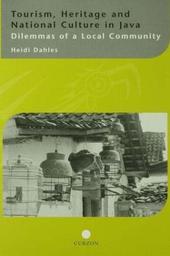
|
Tourism, Heritage and National Culture in Java: Dilemmas of a Local Community
Hardback
Main Details
| Title |
Tourism, Heritage and National Culture in Java: Dilemmas of a Local Community
|
| Authors and Contributors |
By (author) Heidi Dahles
|
| Series | Curzon - International Institute for Asian Studies S. |
|---|
| Series part Volume No. |
v.9
|
| Physical Properties |
| Format:Hardback | | Pages:257 | | Dimensions(mm): Height 234,Width 156 |
|
| Category/Genre | Tourism industry |
|---|
| ISBN/Barcode |
9780700715206
|
| Classifications | Dewey:338.4791598 |
|---|
| Audience | | Undergraduate | | Postgraduate, Research & Scholarly | | Professional & Vocational | |
|---|
| Illustrations |
illustrations
|
|
Publishing Details |
| Publisher |
Taylor & Francis Ltd
|
| Imprint |
RoutledgeCurzon
|
| Publication Date |
19 October 2001 |
| Publication Country |
United Kingdom
|
Description
Based on anthropological fieldwork in the 1990s, this book provides an ethnographic perspective in its examination of the politics and policies of cultural tourism as they were played out under the Indonesian New Order regime. The successful New Order tourism policy ensured that tourism development both contributed to, and benefited from, increasing economic prosperity and a long stretch of political stability. However, that success has come at a price; the policy to encourage mainly 'high-quality' tourism revolved around carefully constructed and controlled tourist experiences that have led to local inequalities. The failure of this policy is analysed in a detailed case study of the city of Yogyakarta. Due to its prominent role in national history, Yogyakarta has been meticulously re-constructed as the cradle of the Indonesian culture, a place where lessons of national history are taught. Yogyakarta spearheaded national government policy throughout the 1970s and 1980s, generating an almost complete dependency on tourism as a source of income, entrepreneurship and employment. While the city benefitted greatly from the New Order tourism policy in terms of increasing visitor numbers, a number of threats to tourism development jeopardise Yogyakarta's future as a major tourist destination. The image of a booming city through successful tourism development is based on strategic marketing instead of a sound structural basis. Tourism development impacts differently on the government-controlled enterprises lining the city's main streets and the small-scale businesses and self-employed people in the neighbourhoods. While the former are organised and managed to fit in with the concept of 'quality' tourism, the latter are tucked away in low-class neighbourhoods (kampung). Both sectors seem to establish two different worlds, occupying separate spaces, organised in different institutions and frequented by different categories of tourists with different needs using different facilities. This book examines the resulting conflicts generated between the 'quality' and 'kampung' tourist industries.
|